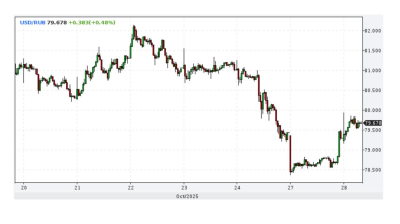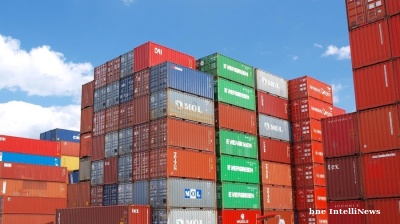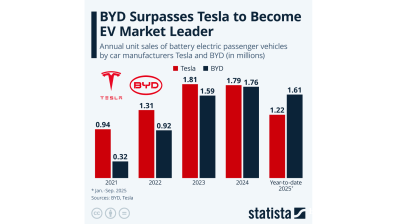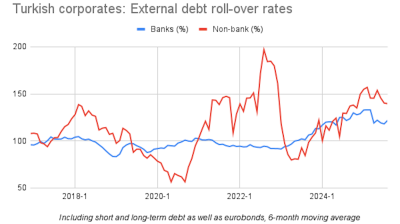Russia’s economy is doing better than expected, the International Monetary Fund (IMF) said in a report on July 26, upgrading its outlook for the contraction expected this year to -6% from -8%.
The extreme sanctions the West imposed on Russia starting in March were supposed to cut Russia off from both the international financial system and starve its war machine in Ukraine. They have only been a partial success due to significant leakage.
The IMF improved the outlook on Russia’s recession by 2.5 percentage points (pp) for 2022 to 6% from the previous 8.5% GDP decline, in the latest edition of the World Economic Outlook published on July 26.
However, the IMF worsened the outlook for 2023 from the previous 2.3% GDP decline in 2023 by 1.2pp to a 3.5% recession.
As followed by bne IntelliNews, GDP forecasts for Russia hit by Western sanctions following the military invasion of Ukraine have recently improved across the board.
“Russia's economy is doing reasonably well in the face of widespread sanctions [for the military invasion of Ukraine],” IMF’s chief economist Pierre-Olivier Gourinch commented on the improved outlook to TASS. Notably, the IMF considers the authorities' measures in the monetary sphere as effective, which gave maintained financial stability and resilient domestic demand.
GDP shrank by 4.3% year on year in May, according to the Ministry of Economy, down from a 2.8% fall in April (chart). However, this was less than economists were anticipating, who have started to improve their outlooks for the full year from the 15% contraction many predicted shortly after the fighting started to around a 10% contraction.
The IMF revised expectation is in line with the Central Bank of Russia (CBR) macroeconomic survey released two weeks earlier, which also forecasts a GDP contraction this year of -6%. The official forecast from both the government and the CBR this year is for a 5% recession. The improved outlooks are underpinned by strong exports, slower-than-expected inflation, recovery in consumer imports, and soft monetary policy by the central bank.
This is an improvement from expectations of a contraction of between 8% and 15% at the start of this year (chart).
"Russia's economy is estimated to have contracted during the second quarter by less than previously projected, with crude oil and non-energy exports holding up better than expected," the report said.
The pain of the sanctions has been eased by the high price of oil caused by limiting supplies out of Russia and a collapse in imports that has pushed the current account surplus up to record levels. Continuously high export revenues are supporting Russia’s economy. Gourinch reminded, however, that a “rather serious recession is still expected" in Russia.
Russia reported a current account surplus of $136bn for the first half of this year, $100bn more than in the same period a year earlier, says Elina Ribakova, deputy chief economist at IIF. The budget is also in profit, although it is expected to go into deficit later this year.
And thanks to an emergency rate hike to 20% on February 28 a few days after the war started coupled with strict capital controls, restrictions on withdrawals from banks and a mandatory foreign exchange surrender requirements, inflationary pressures were held down and inflation began to fall from its April peak of 17.3%. The CBR has been able to since cut rates four times to bring the monetary policy rate back down to 8%, below its pre-war level.
Russia is now the only country in Europe where inflation is falling, while the rest of the Continent struggles to control its stagflation.
Industrial output has been affected, with some sectors being particularly hard hit. Automotive production has almost entirely collapsed, but the latest manufacturing PMI returned to growth in June, largely lifted by the extractive industries.
After starting the year below $80 a barrel, oil prices spiked to nearly $129 in March, before easing back to a little over $105. Gas prices have also soared after Gazprom reduced gas flows to 20% on July 26 by taking a second compressor station offline. While the volumes of both oil and gas exports have been reduced, that has been more than offset by the price increases.
Oil exports sank by 13% from May to June, from 18.9mn tonnes to 16.5mn tonnes, but revenues actually grew from €10.2bn to €10.5bn and are higher than for the same period in 2021.
Russian gas exports fell by about a quarter in June compared with last year, but earnings rose to $11.1bn compared with $3.6bn a year earlier. Crude oil prices are about double last year's level, while natural gas prices are about six times higher.
The impact of the sanctions on most Russians is minimal and life in the cities continues as normal. While many imported foreign brands have disappeared entirely there are no shortages, and more than half of Russia’s business report they have found new suppliers. Only about 5% say they cannot find any alternatives to products they previously imported from the West.
Russia's "domestic demand is also showing some resilience thanks to containment of the effect of the sanctions," the IMF said.
CBR eases currency controls
As the economy stabilises in addition to cutting rates, the CBR has also lifted a lot of the capital controls it imposed in the first months of the war.
The CBR published an extended response to FAQs foreign currency transfer on 27 June. It clarified under what conditions foreign currency transfers by resident individuals between their accounts opened with banks and other financial market institutions located abroad are possible:
▪ From accounts opened with foreign banks before March 1, 2022 to one's own accounts with foreign banks
▪ From accounts opened with foreign banks, regardless of the date of their opening, to one's own accounts in foreign banks in 'friendly' countries
▪ In the case of foreign currency transfers for the maintenance of property (including repairs, security, and other expenses) that is located on the territory of foreign countries and belongs to individuals who are residents by right of ownership. The amount of such transfers cannot exceed the amount of respective funding for such purposes for the preceding calendar year
▪ In case of enrolment of foreign currency to pay for their education and medical expenses and the same expenses of their spouses or close relatives who are such in accordance with the Family Code of the Russian Federation
▪ As a result of conversion into foreign currency of the Russian currency previously received on the bank account (deposit) in rubles opened by the resident in a foreign bank
▪ In all cases, account information must be disclosed to the Russian tax authorities.
Data

Ruble strengthens as sanctioned oil companies repatriate cash
The Russian ruble strengthened after the Trump administration imposed oil sanctions on Russia’s leading oil companies, extending a rally that began after the Biden administration imposed oil sanctions on Russia in January.

Russia's central bank cuts rates by 50bp to 16.5%
The Central Bank of Russia (CBR) cut rates by 50bp on October 24 to 16.5% in an effort to boost flagging growth despite fears of a revival of inflationary pressure due to an upcoming two percentage point hike in the planned VAT rates.

Ukraine's trade deficit doubles to $42bn putting new pressure on an already strained economy
Ukraine’s trade deficit has doubled to $42bn as exports fall and imports balloon. The balance of payments deficit is starting to turn into a serious problem that could undermine the country’s macroeconomic stability.

BYD surpasses Tesla to become EV market leader – Statista
While Chinese manufacturer BYD already pulled ahead of Tesla in production volume last year, with 1,777,965 battery electric vehicles (BEV) produced in 2024 (4,500 more than Tesla), the American manufacturer remained ahead in sales.

_y_y__0.png)


